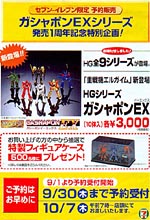![[Alen Yen's ToyboxDX]](images/smlogo.gif)
![[Eau de Alt]](libalt/eaumast.gif)
First things first: there are more used-toy shops now than ever in
Japan. When I made my first trips to Japan in the late 1980s, Tokyo was
home to a handful of vintage-toy stores; you could literally count them
on one hand. Now a vast network of dealers operates across the entire
Japanese archipelago; there must be twenty or thirty separate shops in
Tokyo alone. And that ain't even counting Osaka, Nagoya, Saitama, and
the many, many other cities playing host to the vintage toy boom.
And that's not all. Along with the massive interest in vintage toys and
subsequent high prices has come an unsavory element: bootleggers (such
as your favorite HK Lightan-making friends) and organized crime, who is
rumored to have their fingers in several of the larger Tokyo toy stores.
While you're in no danger of being sliced in two by a chogokin-crazed,
samurai-sword-wielding Yakuza when you shop, the very whisper of their
presence shows just how entrenched and high-profile toy-nostalgia has
become in the fabric of Japanese society.
In spite of this, there's a definite feeling that the other shoe could
drop at any time. 'Interest in vintage toys is a fad. It's like a wave,'
said Kanzen Hentaro, president and owner of Hobby Project. 'It's going
to crest. Or already has.' The recent 'threat' of Bandai and Uni-Five
reissues hasn't helped dealers, either; in spite of the numerous
differences between the '90s and '70s versions of the toys, prices on
certain pieces seem to have plateaued. A specific case in point seems to
be loose-mint original Mazinger Z jumbos.
While these were commanding
upwards of $1000 at one point several years ago, they seem to be selling
at the 50,000 ? 70,000 yen level now. It used to be the case that I
would encounter escalating prices every time I went to Japan; that seems
to have eased for the time being. And while primo pieces still command
top dollar, the fact that theyfre even on the shelf shows that things
have slowed down for the moment. Mr. Watanabe, owner of a toy-shop
called Takarajima, was even able to show me a mint-in-box example of a
Jumbo DaikuMaryuu at his shop, something that wouldn't have even lasted
a week in his store at the height of the boom.
Okay, time to hit the sack. If anyone needs me, I'll be unconscious for
the next fifteen hours.

![]() 09/19/99:
Tokyo Scene 1999
Excerpted from Drunken Toy Journals September 5, 1999, Northwest Flight 0089
09/19/99:
Tokyo Scene 1999
Excerpted from Drunken Toy Journals September 5, 1999, Northwest Flight 0089
It's 9 P.M Friday night. I've crossed the Pacific lugging two
ludicrously heavy diecast-stuffed suitcases, I've been up for something
approaching thirty-five hours straight, and I'm on my sixth cup of
coffee. I should be in bed, dead asleep, but something compels me to rub
the jet-lag from my eyes and begin to write.

![]() Don't get me wrong: collecting ain't done by a long shot. If you want
that DX Chokinzoku T-28, you're still going to have to shell out the
yen. In fact, the most fascinating aspect of this most recent trip was
realizing just how much of an established PRESENCE giant-robot heroes
have in Japan. Teruhisa Kitahara, owner of the Yokohama Tin Toy Museum,
has a weekly toy-appraisal show on television, chogokin are back on the
shelves even at the most pathetic of toy stores, and check out this
advertisement I picked up at the local Seven-Eleven. Although 'gashapon'
rubber figures aren't exactly my cup of tea, there's something immensely
comforting about the fact that -- should the mood strike you -- you can
walk down to the local convenience store at 3am for a six-pack of cheap
sake and even cheaper robot toys.
Don't get me wrong: collecting ain't done by a long shot. If you want
that DX Chokinzoku T-28, you're still going to have to shell out the
yen. In fact, the most fascinating aspect of this most recent trip was
realizing just how much of an established PRESENCE giant-robot heroes
have in Japan. Teruhisa Kitahara, owner of the Yokohama Tin Toy Museum,
has a weekly toy-appraisal show on television, chogokin are back on the
shelves even at the most pathetic of toy stores, and check out this
advertisement I picked up at the local Seven-Eleven. Although 'gashapon'
rubber figures aren't exactly my cup of tea, there's something immensely
comforting about the fact that -- should the mood strike you -- you can
walk down to the local convenience store at 3am for a six-pack of cheap
sake and even cheaper robot toys.
--M.A.